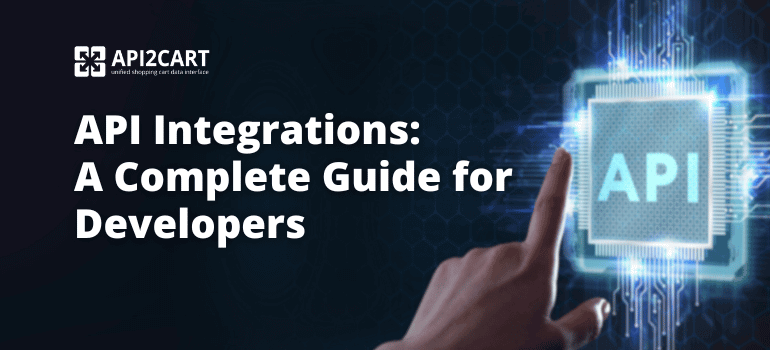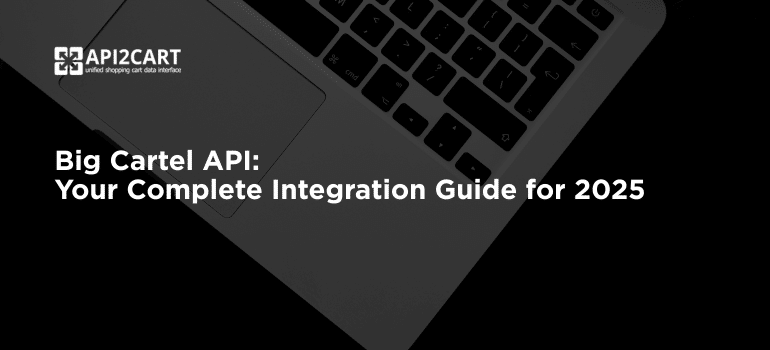
Learn what APIs are, API integrations, and why they are important for building automated workflows and easy data transfer.
Online services as we know them today are highly interconnected with other systems. To fit into the ecosystem of related software, vendors need flexibility. It is important for them to both expose data and consume it. That is why they build integrations and expose their APIs. This allows vendors to exchange information with partner companies. It also helps them connect with internal software developers and customers.
In many cases, API integrations are indispensable. B2B eCommerce software solutions wholly rely on connections with shopping platfroms to deliver their functions and services. For example, order management systems need access to various data. This includes information on products, customers, shipping, and inventory levels. Only then can they process the orders. In this case, there is one effective way to set up ongoing data interchange with the online store. The best solution is to integrate with a shopping cart.
The thing is, along with the benefits of integrations, there are also challenges as well. This integration development means making disparate software work together, and it always has been an enterprise software pain point.
What are APIs?
APIs stand for Application Programming Interfaces. They are a set of protocols, tools, and definitions that allow different software to communicate. APIs enable developers to use features or exchange data from another service or app without needing to know how it works behind the scenes. They let one program request information or actions from another. In response, the program provides the requested data or performs the action. For example, when you open a weather app on your smartphone, it sends a request to a weather service API. The app then receives live weather data and displays it on your screen.

What are API Integrations?
API integration is the process of connecting one application to another using APIs. This makes the two systems work better together. They are helpful for automating tasks, transferring data, and improving software performance. This is crucial in today's digital age. Companies use many applications and systems to work more efficiently. They depend on them to coordinate activities, interact with clients, and deliver products and services.
What Problems Does API Solve?
Boosts productivity
Building applications from scratch rather than using existing solutions can negatively impact the productivity of enterprises. They make software development faster. By using them, developers can faster implement existing functionality instead of creating everything themselves.
Saves money
The greatest benefit of them is that they can save on costs. Since they reduce the effort involved in creating applications, using them to develop apps is a great way to reduce costs.
Boosts connectivity and cooperation
Internal APIs can enhance communication and collaboration within a company. The core functionality of them is connectivity. They enable different systems to communicate with one another, share data and perform varied functions.
Supercharges innovation
Another valuable advantage of them is that they enable businesses to encourage innovation. Nowadays, more than ever, innovation is what drives success.
Improves customer experience
Enterprises can use APIs to create new and efficient ways to interact with customers. Especially in today’s digital age when customers demand a seamless customer experience.
Gathers data for intelligence analytics
With the help of APIs, businesses can easily and quickly gather valuable data. When you make APIs available to third parties, you can see how people are using and interacting with them. This allows you to understand how consumers are engaging with your products.
Creates opportunities for revenue growth
Another benefit of using them is that you open up new revenue opportunities. If you monetize your company's APIs, you can increase the value of your digital resources. This will also help you find new ways to enhance growth.
How Do Successful API Integrations Work?
API integration is connectivity between applications that allows sharing data with each other. In the case of B2B SaaS solutions integration with eCommerce platforms enables them to work with store info. It includes such an info as orders, customers, products, shipments, baskets, and much more. They typically use a third-party solution to execute the integration, as in-house API integration entails a lot of challenges.
API integration is a set of API methods that allow performing CRUD operations, which are as follows: create, read, update, and delete. It is a bare minimum of options in most applications. CRUD operations comprise fundamental methods for accessing and managing data via RESTful APIs. Basically they correspond to five major HTTP methods:
- Create = POST
- Read = GET
- Update = PUT, PATCH
- Delete = DELETE
API Integration Challenges:
- Technological Complexity
- Security Risks
- High Time Consumption
- High Expensiveness
- Maintenance and Upgrading
- System’s Diversity
Technological Complexity
Building a flawless integration module takes a wide range of technical knowledge. You also need to stay updated on the latest API trends. Such experts are worth their weight in gold. Finding a skilled and experienced developer is a major challenge for vendors. It’s especially hard to find someone willing to build an integration for your system.
Security Risks
Security remains one of the main concerns for vendors. API abuse can lead to serious consequences. These include data breaches and financial losses. Such incidents may damage a company’s reputation. They can also harm end customers, if any are involved. Data breach methods are getting more sophisticated. It means that poor integration can become a sheer gift for users with malicious intentions. That is why keeping your connection with another system safe requires control and constant enhancing.
High Time Consumption
Elaborating a properly working integration module involves a great deal of scrutinous work. Setting up just one connection will take at least 4-12 weeks. This is the time when your developer learns the logic and architecture of the platform. They also work to reduce bugs and much more.
High Expensiveness
Have we already mentioned that professional developers are worth their weight in gold? 🙂 If you manage to find one, compensation for a month of hard work on integration will cost you several thousand dollars.
Maintenance and Upgrading
When a connection between the system is established, it is not the end of a story. You will need the IT staff or at least one developer to take care of integration maintenance and upgrading. Otherwise, any functional changes made to the shopping cart can mess up the whole process of data access and manipulation. Plus, your customers might request modifications and custom improvements.
System’s Diversity
There are many types of software and API designs. Each system has its own logic, so every integration comes with unique challenges. If you want to connect with multiple platforms, you’ll need time and technical know-how. And keep in mind—each new integration will take just as much effort as the last one.
API2Cart - eCommerce API Integration Solution
A single API integration is hard. Managing multiple integrations is even harder. That’s why many software vendors work with only a few systems and miss out on business opportunities. Others choose easier solutions, like using an API integration platform, so they can focus on other business tasks. Is there a way to avoid these problems without losing quality or flexibility?
Luckily, yes. There are special solutions, which enable to perform integration faster, easier, cheaper, and safer. As to shopping cart integration, there is an API2Cart. It provides a unified API to connect with over 60 eCommerce platforms, including Shopify, Magento, WooCommerce, Prestashop, etc.
With API2Cart, your software can seamlessly work with essential store data needed for various eCommerce processes. The solution provides 100+ API methods to manage products, orders, customers, shipments, categories, and more. For example, you can:
- Retrieve and manage products using methods, product.list and product.update;
- Work with order data through order.list and order.update to streamline order processing;
- Access customer information with customer.list and customer.info.
These methods make it easy to build features like product catalog synchronization, order import, inventory management, and customer data analysis within your software. Moreover, API2Cart keeps up with any platform API changes on its side, ensuring uninterrupted service and saving your team development time.
By using API2Cart, you focus on building valuable features for your customers instead of worrying about complex integrations or ongoing maintenance.
Doing only one API2Cart integration instead of endless ones offers a good amount of advantages. These are as follows:
- extended features. You will get access to the database of numerous eCommerce platforms. You can retrieve products, categories, clients, orders, and more. This allows you to synchronize the information within your system.
- new business opportunities (due to the ability to apply the changes to extend your services)
- a wider circle of customers (users of the 60+ shopping platforms become your potential clients)
- vast expenses and time loss prevented. There is no need to hire a developer to work on an integration module. You also won’t have to pay for maintaining and updating it when a new version is released.
Conclusion
API integrations are a key part of modern software development. They let different applications connect and work together. Every developer should learn about this integration. It helps them build better and more efficient apps. APIs are used in many systems, such as eCommerce platforms, cloud services, and business tools. By using best practices and the right tools, developers can create secure and effective integrations. This brings value to both users and clients.
If you are interested in integrating your B2B solution with many shopping platforms and marketplaces and overcoming all challenges. Please schedule a consultation with our representative or contact us by chat. So, you can test the functionality of API2Cart and see if it fits your business needs. Also, you can get your 14-day FREE trial period. Using API2Cart, you will be able to connect your system with Magento, Shopify, Amazon, WooCommerce and many other platforms easily. Automate your business processes easily and fast.
The detailed documentation makes API utilizing easy and a dedicated. Tech-savvy tech support team is always ready to help with any matters. API2Cart protect clients’ personal and store information from unauthorized access, so their customers can be assured about their data security.



